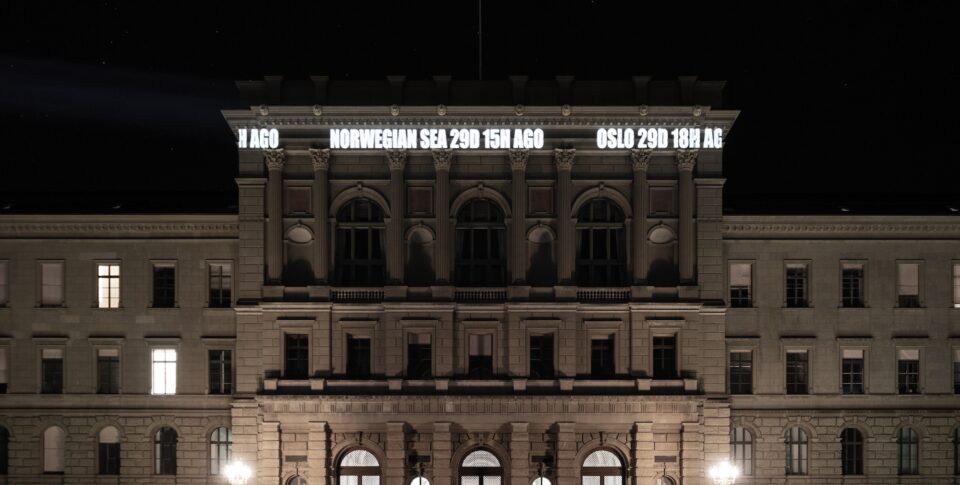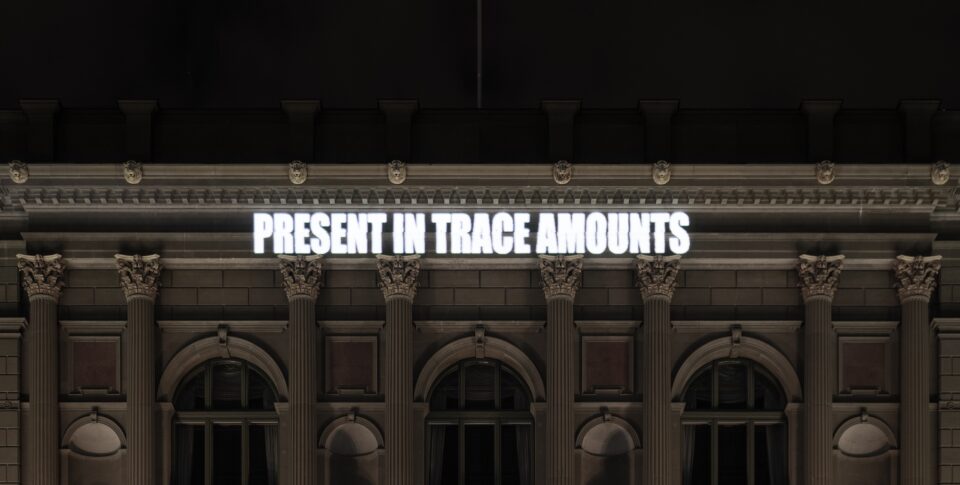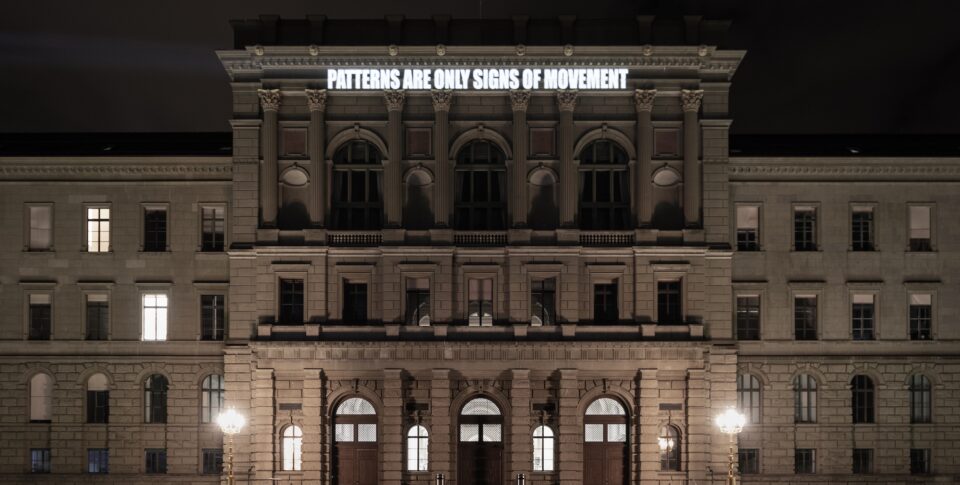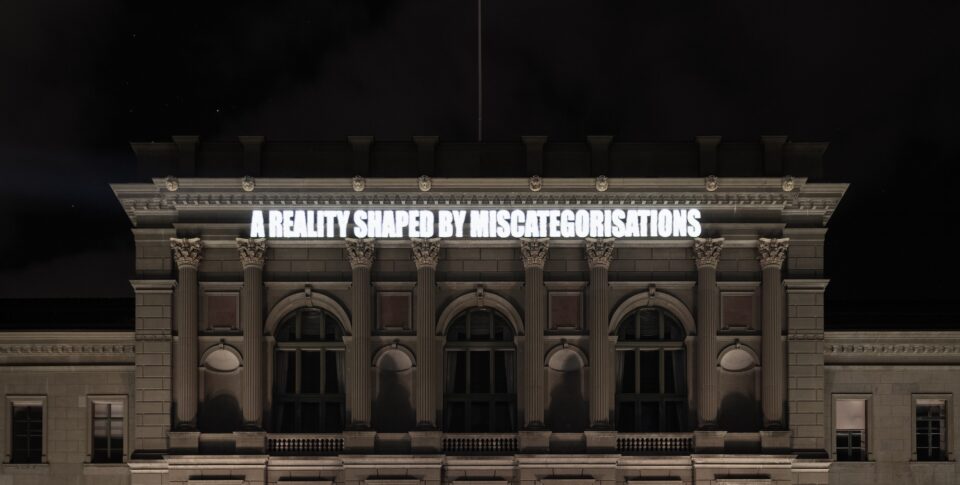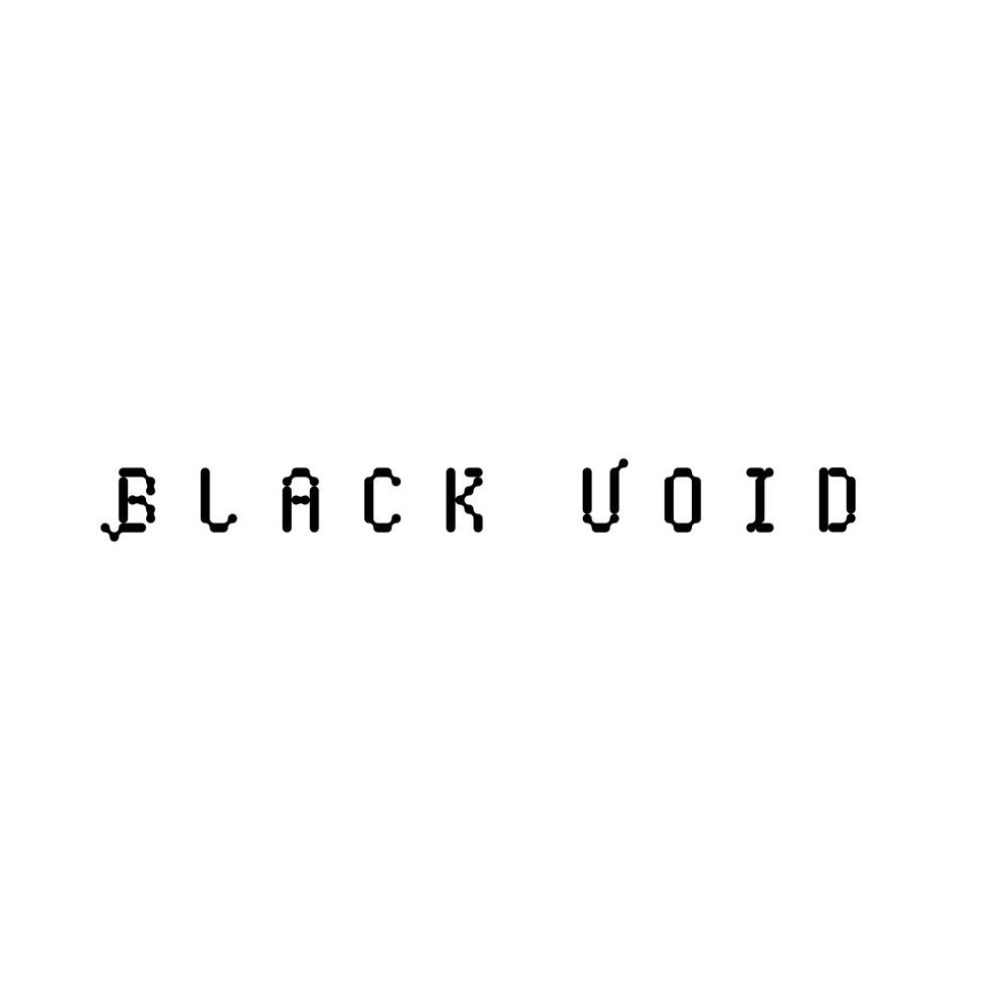Art Exhibits – Climate Ring Shanghai
These works explore the invisible forces, air, data, breath, belief, that connect each of us to global systems and distant environments. BREATHE turns something as everyday as breathing into a powerful act of awareness, revealing how the air around us carries traces of distant wildfires, glaciers, and forests, tracked and visualized through real-time scientific data. Twin Cloud transforms climate data into dynamic digital sculptures, where clouds become reflections of human activity, shifting in shape and mood with pollution and environmental impact. Apocalyptic Optimists offers a visual manifesto of hope and responsibility, using activist-inspired flags to call for a future grounded in care, collaboration, and empathy for all forms of life. Together, these works ask us to move beyond seeing ourselves as separate from nature and instead recognize our deep entanglement with the planet and all who share it.
BREATHE presented in Zurich, Switzerland
As you breathe in and feel the air coursing down into your lungs, the origins of this air are often disregarded unless catastrophic events such as volcanic eruptions or radioactive fallout demand increased awareness. Through the calculation of air parcels from the Modern Art Museum Shanghai, the historical journey of every person’s breath present is tracked and simultaneously constructed.
BREATHE proposes a questioning of human belief systems and definitions of the non-human through the medium of air. It confronts the public with arranged facts and seeks out the dissonances with their own understanding of climate and the ‘environment.’ Just as the air serves as a conduit linking human lives and distant lands, hidden industrial landscapes are also physically linked to us – as proximate as they are distant, and as public as they are secret. The individual integrates into the collective mass of the atmosphere, within a particular moment and place. The concept of absolute independence is revealed as an illusion: everything is conditional on everything else.
This mixture of imagination and scientific data is fuelled by real-time calculations conducted by Dr. Michael Sprenger and Dr. Hanna Joos at the Institute for Atmospheric and Climate Science, ETH Zurich, led by Prof. Dr. Heini Wernli. Learn more about the science here. The results of these calculations, delineating the air’s journey, complete with city names and timestamps – are projected onto multiple facades across the globe. The scrolling text, reminiscent of stock tickers cascading across Wall Street skyscrapers, echoes the ambiance of high-stakes trading. Air, clouds, and water are suggested as potential new commodities in a world driven by trade. Along the cities and timestamps, excerpts from conversations with scientists, poems, and other material collected and created during the calculation processes are projected.
Participants come to understand that the air they breathe has recently passed through Canada’s burning forests, Greenland’s glaciers, or the Amazon Rainforest a mere two weeks prior. Transforming breathing into a conscious act, challenging human notions of reality and perception, and turning surrounding into incorporating.
Scientific background of the project: https://khalilberro.com/breathe-research
Artist
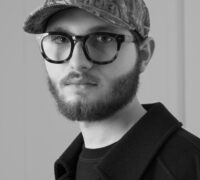
Khalil Berro’s work treats the world as a relational object, shaped by desire, power, and control. At the core of the Swiss-Lebanese artist’s approach lies a poetic engagement with acute locations and environmental sciences, reconfiguring and proposing new modes of perception of the non-human (nature).
His process begins not with a concept, but with a journey, collaborations with scientists, dedicated field research in remote and precarious locations, materialized through methods that range from the highly technological to the dangerously crude. Berro’s research has led his work deep into Arctic coal mines, across chemically-cleared Indonesian palm oil fields, and atop Alpine peaks, launching rockets into clouds to seed artificial rain. Each encounter brings its own ambivalence, its own revelation about the dynamics between humanity and its habitat.
Through film, photography, sculpture, and installation, Berro stages these tensions, making them palpable. His images disorient, proposing new ways of sensing what has always been there, challenging established environmental and cultural realities.
Twin Cloud presented by Black Void: Climate Data Driven Generative Art
<Twin Cloud> is a climate data-driven generative art collection, as well as an art IP focused on sustainability that links crypto art to green practices. Chemicals produced by mountain fires, car exhaust, and industrial production travel far distances in the air, reflecting ground activities. The project has gathered meteorological data worldwide from the Copernicus Ecological Satellite, creating the climate identity of 300 cities worldwide through its digital sculptures. The datasets include greenhouse gasses, aerosol pollutants, humidity, temperature, location, and etc, which all affect the shape, movement, color, and texture of the digital cloud. With the accumulation of chemicals, a soft and sparse cloud may change into a chaotic and violent one.
Artwork by
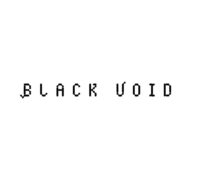
Black Void is an art and science collective, founded and directed by Yixuan Cai, in partnership with Yuhan Xiao, Hong Yun and more members from digital media, architecture, data science and music background. Their artistic endeavors center around the hybrid ecology, interwoven by nature and technologies.
Their works decode ecological events through data and simulate natural energy flows in installations, fostering a dialogue between engineering, energy, and wilderness. They explore themes such as "cloud," "carbon," "solar," and "interstellar life." Their work has been exhibited at Venetian Arsenal, The Guardian Art Center, Power Station of Art, and more.
They have been nominated for 2024 Lumen Prize Impact Award, and won 2025 IDEAT Future Award, first place in PacificVis 2023 Visual Data Storytelling and have been featured in a documentary produced by China Media Group. Past brand collaborations include L'Oréal, Tencent SSV, Audi, Genesis Motor, and etc. (www.blackvoid.xyz)
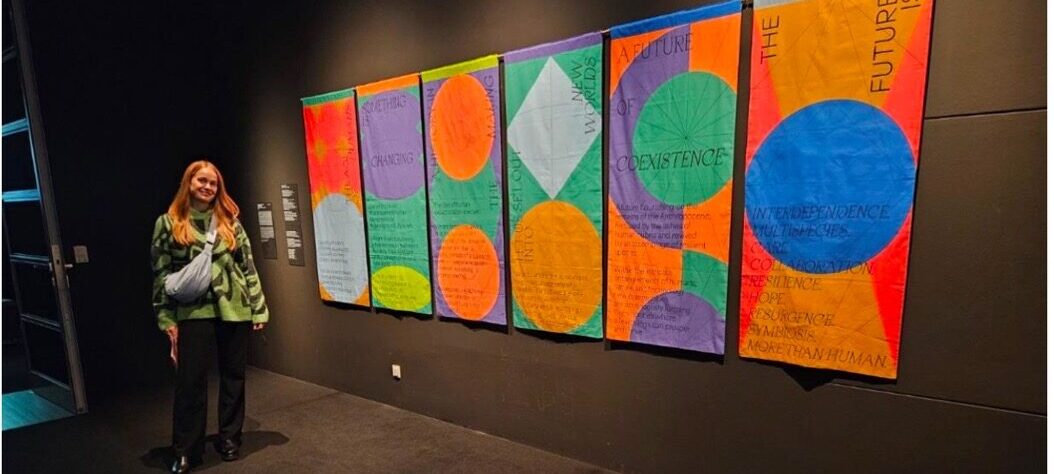
Apocalyptic Optimists: A Manifesto for More Than Human Futures 2022
Apocalyptic Optimists: A Manifesto for More Than Human Futures originated from the research project “Designing for More Than Human Futures” (2021-2022) by Juliana Schneider. The project aims to raise awareness, provoke rethinking, and inspire action toward creating a world that transcends human-centered realities. In this context, design becomes a powerful tool for activism, a medium for advocacy, paving the way for societal change.
The manifesto invites us to question our assumptions and challenge the status quo. It encourages us to imagine different futures and to act in the present to make those futures a reality. The manifesto pushes us to radically imagine a world, life and society beyond the limitations of what is currently considered possible—not what is, but what could be.
Juliana Schneider brought this manifesto to life by designing a series of colorful and optimistic flags, capturing the activist essence of her work.
Find more info here.
Artist
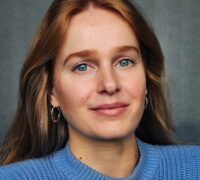
Juliana Schneider is a multidisciplinary designer and futures researcher working at the intersection of social and ecological sustainability. Her practice seeks to move beyond anthropocentric design by exploring the shifting relationships between human and more-than-human worlds—both in the present and across multiple possible futures.
Moreover, through her research and creative work, she investigates the gap between intention and action in the context of sustainability, aiming to surface new narratives and design approaches that challenge dominant paradigms and foster deeper, more responsible forms of engagement.
Partners
Climate Ring Shanghai
-
![]()
Breathing Clouds: Art, Science, and the Air We Share
April 26, 2025This roundtable brings together artists, scientists, and environmental thinkers to explore the intersections of art, science, and policy through the lens of air and clouds, elements that are both invisible and essential, shaping history, climate change, and human experience.
-
![]()
Earth Day Climate Fresk Workshop
April 26, 2025The best fighters need to study their opponent. Where they punch hard. What are their patterns. How they became who they are. Come and study our common opponent Climate Change in a fun and interactive way through the Climate Fresk Workshop. And get ready to join the fight yourself.
-
![]()
Behavioral Insights for Climate Action
April 26, 2025This roundtable explores how behavioral science can drive climate action by examining the psychological, social, and cognitive factors influencing environmental decision-making. Experts will share insights from neuroscience, psychology, and policy implementation to foster sustainable behaviors and effective interventions.
-
![]()
Innovation Night for Climate
April 25, 2025Innovation is often viewed as a vital solution to global challenges such as climate change. However, it also presents its own set of contradictions. This event will explore the complex relationship between climate action and innovation, where bold ideas promise transformation but may also lead to unintended consequences.
-
![]()
The Future Speaks for Itself: Youth Perspectives on the Environment
April 25, 2025Rising temperatures and extreme weather events are already being felt across the globe. In consequence, society is gearing up to transition to a more sustainable system, from politics, innovation, to civil society.
-
![]()
Sustainability and Innovation 4 Impact SwissCham PechaKucha Style Night
April 24, 2025This event organized by SwissCham leverages the globally recognized PechaKucha format, where speakers present their ideas using 20 slides, each shown for 20 seconds, resulting in concise yet impactful presentations lasting just 6 minutes and 40 seconds.
-
![]()
CEA-4 Launch Event & Low-Carbon Urban Design Roundtable
April 23, 2025This event will take place alongside the Low-Carbon Urban Design Roundtable, hosted in collaboration with Swissnex in China during Shanghai Climate Week. This roundtable brings together professionals, designers, and agencies to explore how urban planning and design can contribute to decarbonisation.
-
![]()
Climate Ring Opening Symposium: Sino-Swiss Visions for a Sustainable Future
April 22, 2025This symposium brings together Swiss and Chinese experts from law, psychology, urban planning, and the arts to explore climate change through an interdisciplinary lens. The discussions aim to bridge governance, public perception, and urban sustainability, fostering Sino-Swiss collaboration on climate solutions.
-
![]()
Climate Ring Shanghai
April 22, 2025 — April 26, 2025Step into the ring. Join the fight for our planet. The Climate Ring Shanghai is a collective battle against climate change. In this ring, we don’t exchange punches but ideas and each “round” of discussion brings us closer to impactful solutions.
